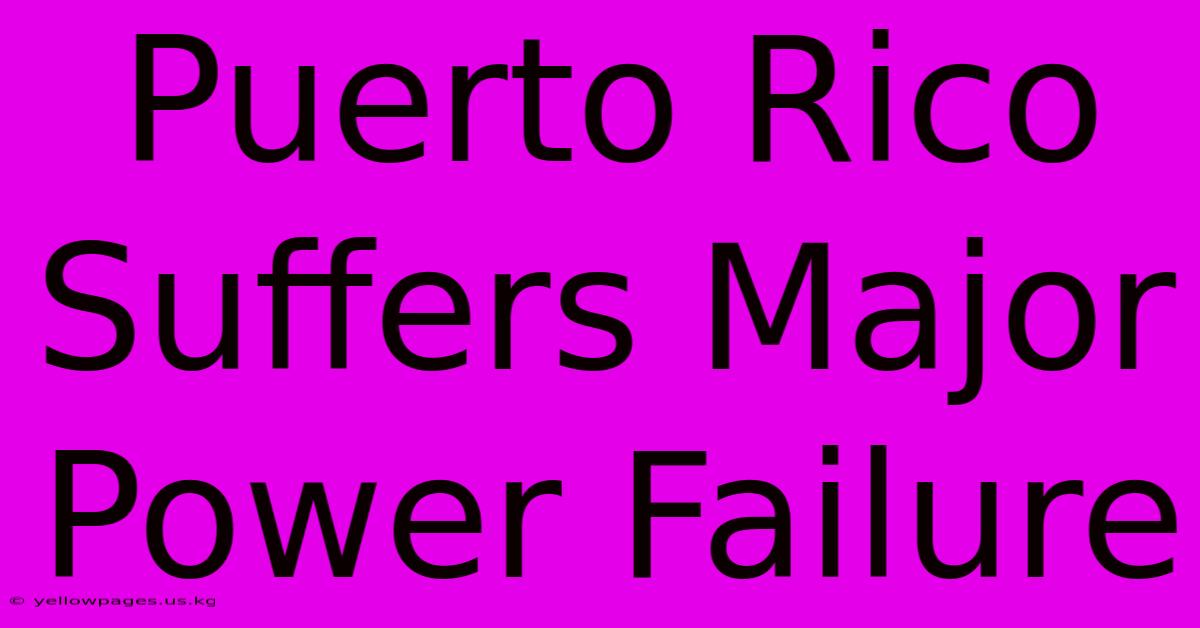Puerto Rico Suffers Major Power Failure

Discover more detailed and exciting information on our website. Click the link below to start your adventure: Visit Best Website trendingnews.us.kg. Don't miss out!
Table of Contents
Puerto Rico Suffers Major Power Failure: A Deep Dive into the Crisis
Puerto Rico, an island already grappling with significant infrastructure challenges, recently experienced a major power failure impacting millions. This widespread outage plunged the island into darkness, highlighting the fragility of its power grid and raising serious concerns about the island's resilience. This article delves into the causes, consequences, and potential solutions surrounding this critical event.
Understanding the Scale of the Blackout
The recent power failure wasn't a localized incident; it was a catastrophic system-wide outage affecting a substantial portion of the island's population. Millions were left without electricity, disrupting essential services, businesses, and daily life. The sheer scale of the blackout underscores the urgent need for comprehensive grid modernization and infrastructure improvements. This isn't the first time Puerto Rico has faced such a crisis; past hurricanes have exposed the vulnerability of its power grid, leading to prolonged outages and significant economic losses.
Immediate Impacts: Beyond the Darkness
The impact extended far beyond the immediate loss of power. Hospitals scrambled to maintain essential services using backup generators, while businesses faced significant financial losses due to closures and spoiled inventory. The lack of electricity also impacted water supply, sanitation systems, and communication networks, creating a domino effect of disruptions across various sectors. The social implications were equally profound, leaving many vulnerable residents without access to essential resources and medical care.
Unpacking the Causes: A Complex Web of Issues
Pinpointing the exact cause of the blackout requires a nuanced understanding of Puerto Rico's power grid. While investigations are ongoing, several factors likely contributed to the widespread failure:
- Aging Infrastructure: Decades of neglect have left Puerto Rico's power grid in a state of disrepair. Outdated equipment, insufficient maintenance, and a lack of investment have created a system prone to failures.
- Lack of Investment: Years of insufficient funding for grid modernization have exacerbated the problems. The island's power authority has struggled to secure the necessary resources to upgrade its infrastructure.
- Natural Disasters: While not the direct cause of this specific outage, past hurricanes have inflicted significant damage on the grid, leaving it vulnerable to further disruptions. The cumulative impact of these events has weakened the system's overall resilience.
- Operational Issues: Potential operational errors or unforeseen events may have triggered the cascade failure that resulted in the widespread blackout. A comprehensive investigation is crucial to determine the precise role of such factors.
Long-Term Consequences: A Call for Action
This power failure highlights the urgent need for long-term solutions. The island cannot afford repeated occurrences of such widespread outages. The consequences extend beyond immediate inconvenience, affecting:
- Economic Stability: Disruptions to businesses, tourism, and other economic activities can lead to significant financial losses and hinder economic growth.
- Public Health: Prolonged power outages can compromise access to healthcare, particularly for those reliant on medical equipment or life-support systems.
- Social Equity: Vulnerable populations are disproportionately affected by power outages, exacerbating existing inequalities.
Towards a More Resilient Future: Potential Solutions
Addressing Puerto Rico's power grid challenges requires a multi-pronged approach:
- Modernization of Infrastructure: A significant investment in modernizing the grid is crucial, including upgrading equipment, enhancing transmission lines, and incorporating smart grid technologies.
- Increased Investment: Securing adequate funding for infrastructure improvements is essential. This may involve seeking federal aid, attracting private investment, and implementing efficient resource allocation strategies.
- Diversification of Energy Sources: Exploring renewable energy sources, such as solar and wind power, can enhance grid resilience and reduce reliance on fossil fuels.
- Improved Emergency Preparedness: Strengthening emergency response plans and ensuring access to backup power sources are critical for mitigating the impact of future outages.
The recent major power failure in Puerto Rico serves as a stark reminder of the urgent need for comprehensive grid modernization and improved infrastructure. The island's future depends on addressing these challenges proactively to ensure a reliable and resilient power supply for its citizens. This requires a collective effort involving government agencies, private investors, and the international community. Only through sustained investment and collaborative action can Puerto Rico overcome its energy challenges and build a more secure and prosperous future.

Thank you for visiting our website wich cover about Puerto Rico Suffers Major Power Failure. We hope the information provided has been useful to you. Feel free to contact us if you have any questions or need further assistance. See you next time and dont miss to bookmark.
Featured Posts
-
Dallas Store Hours New Years Eve 2024
Jan 01, 2025
-
Jolie And Pitt Settle Long Divorce
Jan 01, 2025
-
Relia Quest Bowl 2024 Alabama Vs Michigan
Jan 01, 2025
-
Mdard Smart Choices For Michigan 2025
Jan 01, 2025
-
New Years Eve Power Failure In Puerto Rico
Jan 01, 2025
